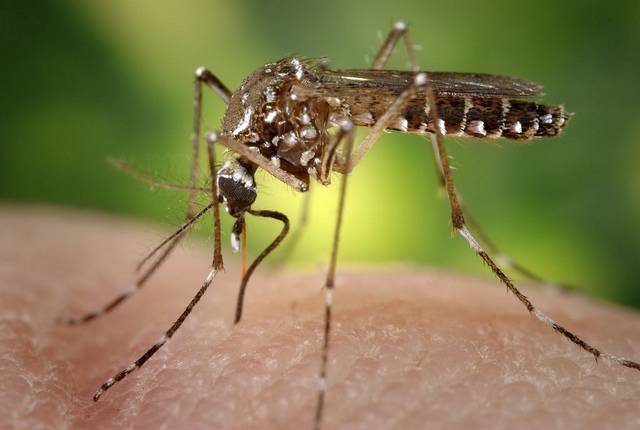
Mosquito-borne illnesses are a considerable burden on human and animal health, so understanding what influences the behavior of mosquitos could be useful. A recent study published in PLOS Genetics suggests that there may be a genetic component to mosquito behavioral preferences, including what they choose to bite.
The control of malaria depends on the propensity of mosquitos to bite humans versus other hosts—if mosquitos prefer humans, then they’re more likely to spread diseases between humans, but if they prefer to feed on other animals (like cows, for example), then mosquitos may not be contributing as significantly to the human burden of disease. Additionally, control of malaria depends on the tendency of mosquitos to rest in places where we can ensure they are likely to come into contact with insecticides. Mosquitos are more likely to encounter insecticides indoors, because homes in countries where malaria is endemic are more likely to have long-lasting, insecticide-treated nets, which will kill mosquitos if they come into contact with them. These nets are highly effective and have pared down the number of dangerous mosquito species in many parts of Africa.
For this PLOS study, some researchers were interested in investigating the potential that the surviving mosquitos may have adapted their behavior to avoid control measures like nets. And, if this were occurring through evolution, it should have left a mark in the pests’ genomes. So they investigated the genetic basis for mosquito host and resting area choices.
Researchers collected the mosquitos from villages in Africa, selecting specimens based on their primary hosts and resting areas. They selected some specimens that preferred to feed on cattle, others that preferred to feed on humans, as well as specimens that tended to rest either outdoors or indoors.
The scientists then sequenced the genomes of 23 human-feeding mosquitoes and 25 cattle-feeding mosquitos. They found a total of 4.8 million base-pair differences that they used to conduct the first genome-wide estimates of heritability for host choice and resting behavior. They used a principal component analysis to segregate individuals into three groups based on genomic variation. This uncovered a genetic component for host choice but did not find anything associated with indoor/outdoor resting behaviors.
In the researchers' analysis, they found some compelling indications for a genetic component to host choice by using what’s called a chromosomal inversion analysis. A chromosomal inversion is a piece of chromosome that is flipped relative to its normal orientation. Chromosomal inversions do not necessarily cause abnormalities on their own, but they can be useful genetic markers. In this experiment, the researchers looked closely at two chromosome inversions known as 3Ra and 2Rb.
They used a novel inversion genotyping assay to detect a significant enrichment of the arrangement of 3Ra genetic inversion among cattle-fed mosquitos. Included in this inversion were two genes that coded for odorant signaling proteins and odorant receptors. The researchers think that these proteins may be linked to the preference for cattle over humans as a food source.
Though there are no immediate consequences to this finding, there are many ways in which this information could be used for future mosquito control measures. Perhaps targeted insecticidal approaches that alter the functioning of this odorant protein or receptor could be an effective future means of mosquito control. Or, alternatively, introducing lots of mosquitos with this genetic difference to the mosquito population could reduce the percentage of mosquitos that prefer to feed on humans. This paper is the first finding connecting a mosquito genetic variant with a specific behavioral pattern, and the finding opens the door to new potential control measures in the future.
PLOS, 2016. DOI: 10.1371/journal.pgen.1006303 (About DOIs).
reader comments
31